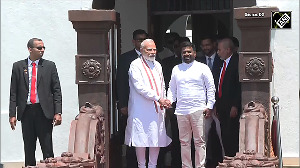Imagine a world where half the population is above the age of 80. It is a cause for celebration.
For death is horrible, something one would not wish for another, especially one's parents. It is also debatable as to when one ages, 60, 70, 80, or maybe 90?
The prime minister of India is over 75 and the man driving the nation's Metro revolution, E Sreedharan, is 75. It seems the world is destined to be eternally young.
Maybe this is to romanticise the matter. The authors of a book, "The Impact of Ageing: A common challenge for Europe and Asia," in which the contributor from India, Harpal Singh, is the chairman of the national committee on public health of the Confederation of Indian Industry (CII) and non-executive chairman of pharmaceutical company Ranbaxy throws cold water on such notions.
It looks at the economic implications of nearly half the global population turning over 60 by 2050, with declining population and the concentration of three-fourths of this population in Asia.
Among the big two in numbers, China will see its old outnumber the young 25 years earlier than India due to decreasing fertility, says the book. Edited by an Austrian, Gabrielle Sinigoj, it addresses even more the concerns of Europe, which runs the risk of having a constantly depleting workforce and increasing expenditure on social security.
India, of course, has left its aged to the mercy of the five elements with no social security cover. Which is alarming, especially as the book points out that the number of people above 65 will double in India by 2050.
The parents mostly rely on their children, who are most of the time at work. The parents are alone, jobless, stumbling their way to post offices, banks and clinics. Age is accompanied by weakness and illness, and conditions like low vision and diabetes.
Solutions are emerging here and there. In Delhi, after a spurt of murders of aged people, some resident welfare associations decided to address the needs of the aged in their areas.
The Ministry of Social Justice and Empowerment will assist formation of volunteer bureaus of old people from April this year in 10 cities. These bureaus would be given an annual grant of Rs 2 lakh for helping their members find useful engagements and meeting their needs.
The previous Budget announced a monthly pension of Rs 300 for those above the age of 65. These are small-time doles that are spread too thin to reach the 8 million people who are aged 81 and above.
Besides, as Mathew Cherian of Helpage India says, pensions seldom reach beneficiaries. His NGO works in 900 villages just trying to help people collect their pensions.
Religious institutions can play a role with the huge wealth many of them have. Gurudwaras known for their langars also run communes for the aged where they can live their last days in peace without worrying about healthcare.
Rich temples at Tirupati, Guruvayur and Vaishnodevi, churches like Velankanni, and dargahs like Ajmer Sharif and Nizamuddin can easily replicate the model.
Industrialists have been doing their bit, but for their own people. There is the an old-age home built by Kerala billionaire PC Menon in Palakkad where old couples live in five-star comfort free of cost. But of the 81 million old people in the country, 51 million are so poor that they can't afford one square meal a day.
The CII admits it has done nothing for the aged so far. Says Harpal Singh: "We will announce an action plan soon. Anil Ambani's Harmony for Silvers Foundation is dedicated to the aged and plans to have old age homes all over the country. Maybe the CII could take a leaf from that."







 © 2025
© 2025